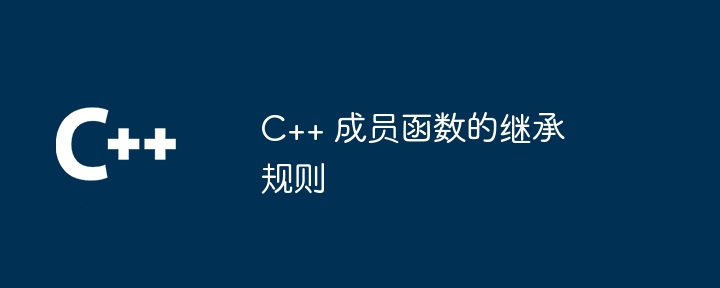
C Member function inheritance rules: Public inheritance: If a derived class publicly inherits the member functions of the base class, then the member functions of the derived class are also public. Protected inheritance: If a derived class protects and inherits the member functions of the base class, then the member functions of the derived class are protected. Private inheritance: The derived class privately inherits the member functions of the base class. The member functions of the derived class are private and cannot be directly accessed by the derived class itself.

Inheritance rules for C member functions
In C object-oriented programming, a class can inherit from a base class through inheritance Data members and member functions. For the inheritance of member functions, follow the following rules:
Practical Example:
Consider the following example:
class Shape {
public:
virtual double getArea(); // 抽象函数
};
class Rectangle : public Shape {
public:
Rectangle(double length, double width);
double getArea() override; // 重写父类的 getArea 函数
private:
double length;
double width;
};
class Square : protected Shape {
public:
Square(double side);
double getArea() override;
private:
double side;
};
class Circle : private Shape {
public:
Circle(double radius);
double getArea() override;
private:
double radius;
};In this example:
class publicly inherits the Shape class, so the getArea function is also public in the Rectangle class. The
class protection inherits the Shape class, so the getArea function is also protected in the Square class. The
class privately inherits from the Shape class, so the getArea function is private in the Circle class.
Note:
The above is the detailed content of Inheritance rules for C++ member functions. For more information, please follow other related articles on the PHP Chinese website!
 What are the differences between c++ and c language
What are the differences between c++ and c language
 Recommended learning order for c++ and python
Recommended learning order for c++ and python
 Cost-effectiveness analysis of learning python and c++
Cost-effectiveness analysis of learning python and c++
 Is c language the same as c++?
Is c language the same as c++?
 Which is better to learn first, c language or c++?
Which is better to learn first, c language or c++?
 The difference and connection between c language and c++
The difference and connection between c language and c++
 C++ software Chinese change tutorial
C++ software Chinese change tutorial
 Cost-effectiveness analysis of learning python, java and c++
Cost-effectiveness analysis of learning python, java and c++




